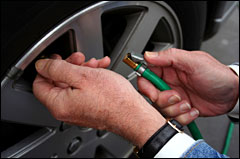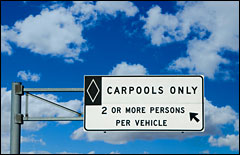Greening your life in lots of areas is a relatively simple affair, involving you, your conscience, and your wallet. Greening your commute is a tad bit more complicated, involving you, your conscience, and your job — that annoyingly mandatory life entity that puts scratch in the aforementioned wallet.
Complicating matters further, the eco-level of your commute depends to a great extent on where you live. It’s one thing to rideshare in New York or Chicago. In Shelby, Mont., it’s quite another — unless, that is, you don’t mind hitching lifts on tractors and 18-wheelers.
This doesn’t mean you should kick the idea of green commuting to the curb. Americans drive 734 billion miles to and from work each year — and spend an average of 47 hours stuck in rush-hour traffic. Ugh. No matter where you live or work, it’s possible to tweak your ride, your mode of transport, and, when the boss is flexible, even your locale. You may not be able to ditch your job, but you can change how you get there.
Here’s how to start.

Get pumped.
Level One: The Baby Step
Whistle a happy tune. If you absolutely, positively can’t avoid driving your car to work (or for work), at least make sure you keep the ol’ jalopy tuned up. You can save gas money and reduce your car’s emissions by changing your oil regularly; keeping tires inflated to the recommended level; and checking hoses, filters, and spark plugs on a regular basis. According to the Oregon Environmental Council, a car that’s out-o-tune uses nearly 10 percent more gas than one that’s properly maintained.
Level Two: The Next Steps
Go public. If there’s a way to get to work that doesn’t involve your mean, ungreen driving machine, use it. According to the American Public Transportation Association, increasing numbers of Americans are seeing the merits of taking the bus or train; public transit ridership is up 32 percent since 1995, and ridership in 2007 was the highest in 50 years. At the same time, the Energy Department predicts that Americans will buy less gas this year than last year, the first yearly decline since 1991. Think riding the bus sounds like a headache? Just pop on the iPod and grab a good book — you’ll be amazed at how it feels to get your life back.

Dare to share.
Share your dealings. Sure, it may seem like fodder for a bad sitcom, but carpooling is a solid option, and one that nearly 11 percent of U.S. commuters choose, according to the U.S. Census Bureau. Given rising gas prices and random incentives, that number may be on the rise. Carpooling’s hip younger sibling, carsharing, is also catching on across the country. Members can save money on gas, insurance, and maintenance — while still getting the bliss of controlling the radio dial.
Stay home — with permission. We’re not advocating playing hooky (well, not every day), but if you can work out a deal to work from home one or more days a week, you’ll be doing the planet a favor. According to surveys, about 4 million Americans telecommute regularly, while 45 million do so at least once a week. That equates to a lot of unemitted emissions. Think you can’t convince your boss to let you work from home? Here are a few tips for making the case.

Build the life you want.
Level Three: The Big Step
Get moving. Next time you look for a job or look for a house, consider their distance from each other. (And poke around — some cities have incentive programs for living close to work.) As recently as 1960, nearly 10 percent of Americans walked to their jobs; today, that number is around 2.5 percent, with certain geographical exceptions (go Boston!). Even if you can’t live close enough to your workplace to walk there, a shorter drive or ride will save you time and money. Then you can use all your spare time to fine-tune that invention — you know, the one that’s going to make you a skillionaire who never needs to work again.
Resources
Tips for smarter driving
Simple Tips to Green Your Commute
U.S. Department of Energy Tips to Improve Your Gas Mileage
Environmental Defense Fund
Public Transportation, Carpooling, and Carsharing
American Public Transportation Association
Directory of U.S. Rideshare and Carpool Resources
eRideShare
Guide to Car Sharing Programs in North America
Telecommuting
The Telework Coalition
Clean Air Council’s Green Commute Program


